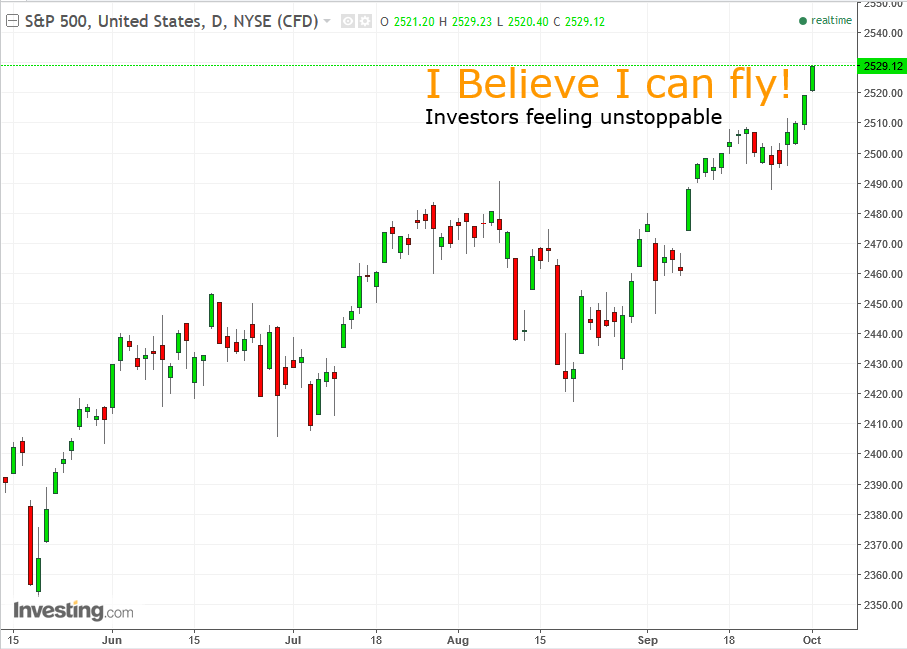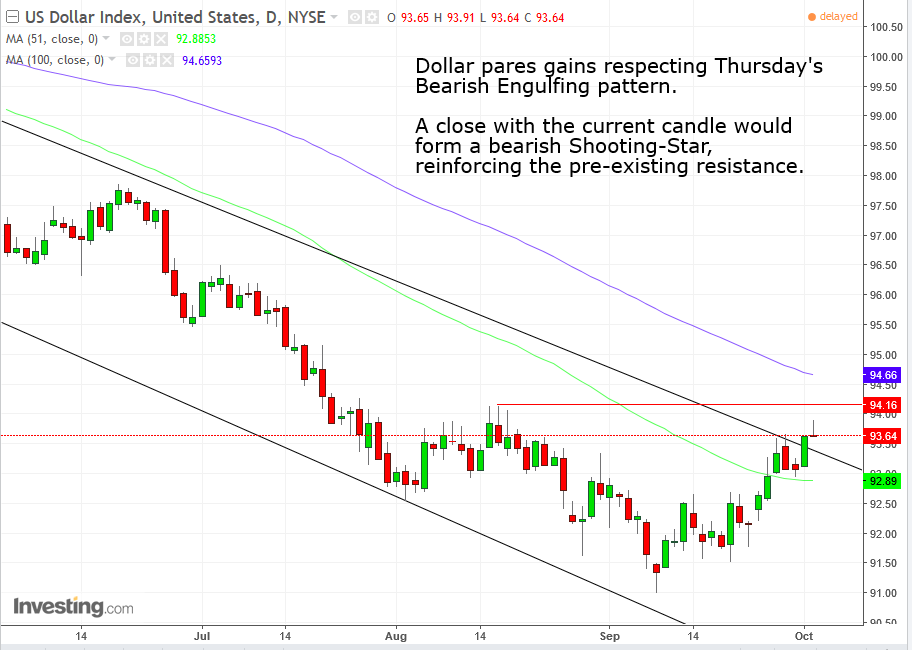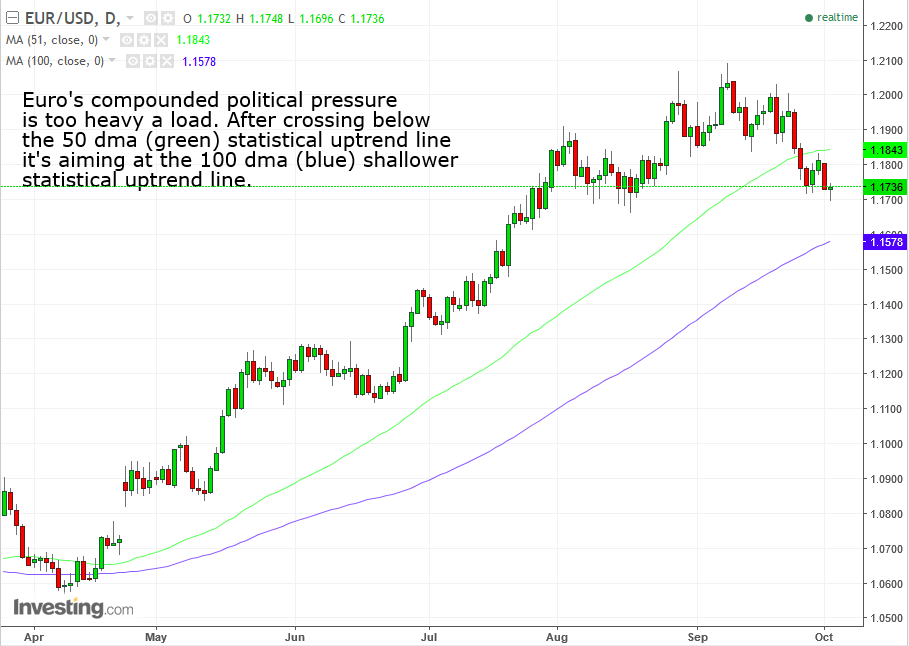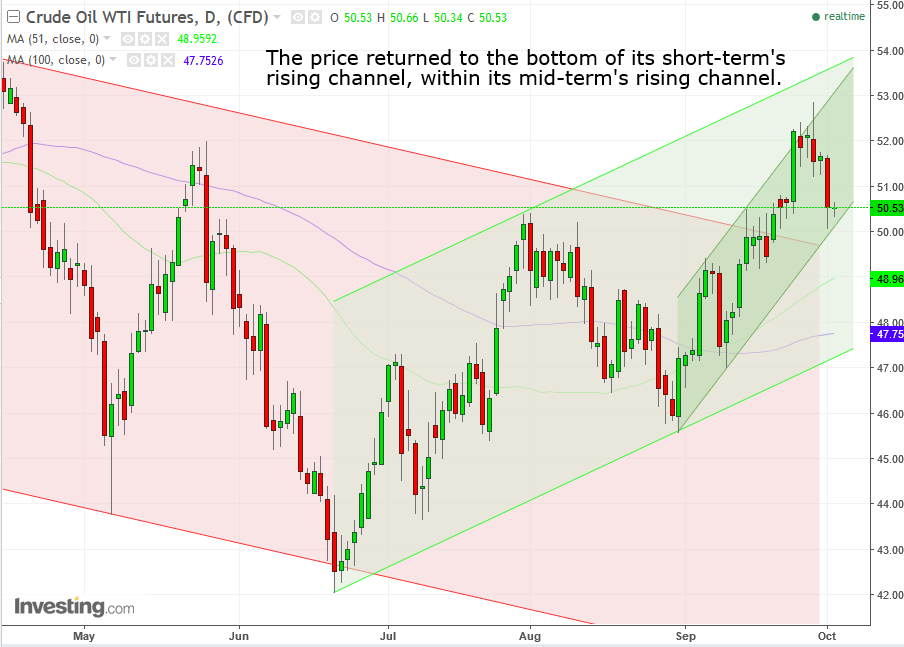Street Calls of the Week
by Pinchas Cohen
Key Events
- Equities recorded fresh record highs on the fastest US manufacturing growth in 13 years
- While Asia continued the rally, Europe stalled out
- Are traders taking a breather or reconsidering the fundamentals?
At long last, after yesterday's ISM Manufacturing data release, the US economy finally exceeded expectations. Afterward, Citigroup’s US Economic Surprise Index rose to positive territory for the first time since April, when news broke that the index, which monitors factory-related employment, production, inventories, new orders and deliveries, climbed to 60.8, from 58.8.
While an above-50 read indicates expansion, this jump was the fastest pace for the release in more than a decade, since May 2004—long before anyone even imagined the Great Recession of 2008. As well, the new orders measure increased to 64.6 from 60.3, the strongest since February. As well, the employment component climbed to 60.3 from 59.9, the best reading for that measure in more than six years. Finally, the index of prices paid rose to 71.5 from 62, the highest since May 2011.
Such robust factory data coupled with the ongoing anticipation of US tax reform boosted confidence as well as investor appetite for a slice of the pie.

The dollar was buoyed and US equities, including the S&P 500, registered fresh record-highs yesterday. The bullishness made it across the electronic seas to Asia this morning.
Global Financial Affairs
Japan’s TOPIX closed at its highest levels in more than two years. Chinese equities in Hong Kong experienced their sharpest surge since April 2016, after the PBoC announced it’s cutting reserve requirement ratios for some loans. This on top of the country’s official factory gauge reaching a five-year high yesterday.
While trading partner Australia's shares enjoyed a boost, China’s market was closed for the National Day holiday.
USD traders put the green back into the dollar trade as they carried the currency higher than all its major counterparts. During Asian trading it reached its highest point since August 17.

However, by the time European markets opened, both stocks and the dollar lost momentum. As of 4:00 EDT the US currency has retreated to it opening position, finding resistance at last Thursday’s Bearish Engulfing Pattern.

Objectively, the euro is still under pressure, as tensions continue to foment in Catalonia, with German coalition uncertainties also looming. The Stoxx Europe 600 Index, unable to gain uptrend momentum on fresh US records and an Asian rally, is churning, and the single currency is meandering.
Is the market wheel of fortune simply taking a break or are investors re-considering the basis for this most immediate rally—a possible, too-good-to-be true manufacturing read? Haven’t we, after all, been warning about expected data noise that could follow last month's devastating hurricanes?
There may indeed not be a clear picture available of the future, but more political uncertainty is assured, at least in Europe, as well as in the UK whose Hard Brexit plan could incur a $22.7 billion trade loss. Additionally, while, a weaker pound should boost equities because it will make the country's exported goods more competitive, it is also slowing economic growth by raising the cost of imported commodities. That was clearly signaled by yesterday's disappointing UK Manufacturing PMI release showing a drop to 55.9 last month from 56.7 previously.
Up Ahead
- U.K. politicians Johnson, Davis, Rudd and Fox speak at the Conservative Party Conference.
- Investors will monitor progress toward forming coalition governments in Germany and New Zealand after elections last month left no clear majority party in either country.
- U.S. data this week includes trade, factory orders and Friday’s September Nonfarm Payrolls report, which, due to likely distortions from hurricane-related activity since late August, may have less predictive power than usual for the economic outlook.
- On Wednesday, the Reserve Bank of India is projected to keep benchmark rates unchanged.
- China is due to report monthly foreign-exchange reserves on Thursday.
- Fed Chair Janet Yellen speaks at an event on Wednesday.
- Minutes of the last ECB meeting are the European economic highlight this week.
Market Moves
Stocks
- Japan’s Nikkei 225 jumped 1.1 percent to the highest close for the index since August 2015; the TOPIX added 0.7 percent.
- Hong Kong's Hang Seng Index rose 1.8 percent.
- India’s BSE Sensex rose 1 percent as trading resumed after a three-day holiday weekend.
- The Stoxx Europe 600 Index gained less than 0.05 percent as of 8:37 a.m. London time, hitting its highest point in 15 weeks.
- The MSCI All-Country World Index increased 0.1 percent, hitting a record-high with its fifth consecutive advance.
- The FTSE 100 fell 0.1 percent, the first retreat for the UK index in a week.
- The DAX jumped 0.6 percent, a record-high for the German index with its sixth consecutive advance.
- The MSCI Emerging Markets Index jumped 0.8 percent to its highest in more than a week.
- S&P 500 Futures climbed 0.1 percent, reaching the highest on record with its fifth straight advance.
Currencies
- The Dollar Index is flat, having pared a 0.3-percent advance during Asian trading, though still its highest since August 3.
- The yen dipped 0.3 percent to 113.06 per dollar, the currency's weakest showing in almost 12 weeks.
- The euro was unchanged at $1.1733, the strongest in almost seven weeks.
- The British pound fell less than 0.05 percent to $1.3274, the weakest in almost three weeks.
Bonds
- The yield on 10-year Treasuries gained one basis point to 2.35 percent, the highest in 12 weeks.
- Germany’s 10-year yield rose two basis points to 0.47 percent.
- Britain’s 10-year yield climbed three basis points to 1.359 percent.
Commodities
- Gold declined less than 0.05 percent to $1,270.62 an ounce, the weakest point for the precious metal in eight weeks.

- West Texas Intermediate crude fell 0.1 percent to $50.55 a barrel, the lowest in two weeks.
